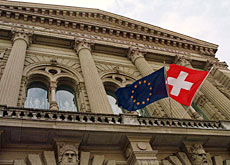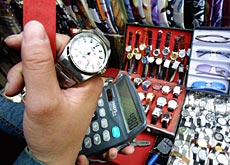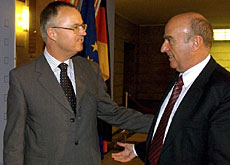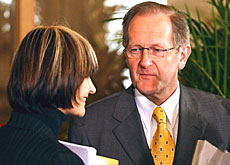Switzerland and EU seek accord on re-export tax

The European Union says it is “confident” that it will reach an agreement with Bern over the taxation of re-exports from Switzerland by the beginning of May.
Swiss officials met their EU counterparts on Wednesday in a bid to persuade Brussels not to impose the tax as planned in June.
“Our discussions were open and constructive…and different options were examined,” said EU spokesman Jonathan Todd.
“We are confident that we will have a solution by the beginning of May. And this solution will, of course, try to minimise any trade anomalies between Switzerland and the EU,” he added.
EU officials refused to be drawn on the nature or terms of possible solutions under discussion.
But Luzius Wasescha, a senior Swiss trade official who led the country’s delegation to Brussels, made it clear agreement was still a long way off.
“It’s too early to be triumphant or to celebrate,” Wasescha said at a press conference following Wednesday’s talks.
Status quo
He added that the aim was to “preserve the status quo” and warned that “several thousand jobs” in Switzerland and the EU would be threatened by the introduction of the tax.
A row over the proposed tax on re-exports from Switzerland broke out two months ago after the EU unveiled plans to levy the charge – without officially communicating its decision to the Swiss government.
Switzerland won some breathing space at the end of February after the EU agreed to delay the introduction of the tax for a period of three months.
Under a trade agreement dating back to 1972, products and materials imported to Switzerland and subsequently exported back to the EU have not been subject to customs charges.
Counting the cost
Brussels maintains the accord does not apply to re-exports, while the Swiss government argues that Switzerland’s textile, chemical and pharmaceutical industries – which rely on raw materials from EU member states – would be hardest hit by the tax.
In an earlier interview with swissinfo, Wasescha said the decision could cost the chemical industry as much as SFr2 billion ($1.62 billion) a year.
Both the EU and Switzerland have rejected speculation that the announcement of the tax was timed to increase pressure on Bern to sign an agreement to hand over income from EU residents’ savings in Swiss banks.
This is currently blocking Swiss-EU negotiations on a second round of bilateral accords.
swissinfo with agencies
The new tax would apply to products exported from Switzerland to the European Union which were made using raw materials imported from EU member states.
The chemical, textile and pharmaceutical industries are likely to be most affected by the tax.
At the end of February, the EU agreed to delay the introduction of the tax for a period of three months.
The EU hopes to find an agreement by the beginning of May, but the Swiss are more cautious.

In compliance with the JTI standards
More: SWI swissinfo.ch certified by the Journalism Trust Initiative



You can find an overview of ongoing debates with our journalists here. Please join us!
If you want to start a conversation about a topic raised in this article or want to report factual errors, email us at english@swissinfo.ch.